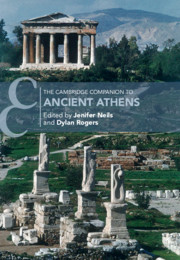Book contents
- The Cambridge Companion to Ancient Athens
- Cambridge Companions to the Ancient World
- The Cambridge Companion to Ancient Athens
- Copyright page
- Contents
- Contributors
- Abbreviations
- Athens: An Introduction
- 1 #Leagros: An Athenian Life
- Part I The Urban Fabric
- Part II Inhabitants
- Part III Business/Commerce
- Part IV Culture and Sport
- Part V Politics
- 27 Associations
- 28 Rule of Law and Lawcourts
- 29 Armed Forces
- Reception
- Index
- References
27 - Associations
from Part V - Politics
Published online by Cambridge University Press: 10 March 2021
- The Cambridge Companion to Ancient Athens
- Cambridge Companions to the Ancient World
- The Cambridge Companion to Ancient Athens
- Copyright page
- Contents
- Contributors
- Abbreviations
- Athens: An Introduction
- 1 #Leagros: An Athenian Life
- Part I The Urban Fabric
- Part II Inhabitants
- Part III Business/Commerce
- Part IV Culture and Sport
- Part V Politics
- 27 Associations
- 28 Rule of Law and Lawcourts
- 29 Armed Forces
- Reception
- Index
- References
Summary
This chapter offers an introduction to Athens’ associations – groups of people who came together for some purpose, but which were neither families nor central state institutions. After broaching some problems of definition, it provides a gazetteer of some of the city’s better-known associations; it then provides a narrative of Athens’ associations over time, and closes with a brief discussion of the question of what relationship these groups had with Athens’ democratic form of government.
- Type
- Chapter
- Information
- The Cambridge Companion to Ancient Athens , pp. 379 - 391Publisher: Cambridge University PressPrint publication year: 2021
References
Further Reading
A few overviews of Athens’ associations and their role in the polis have appeared relatively recently. Jones 1999 (a seminal work) marshals the evidence in support of a number of interesting and original hypotheses, though not all of these have found ready acceptance. Ismard 2010 is a magisterial overview of the evidence within a stimulating, if sometimes somewhat complex, theoretical framework. Johnstone 2011 is an idiosyncratic, independent-minded, and highly original discussion of a range of Athenian groups and institutions. Kierstead 2013 investigates the role that associations might have played in building up trust, dispersing authority, and hence in sustaining the democracy.
For individual associations, there is still much to be learned from the standard works, even if some appear dated. These are Whitehead 1986 on demes, Lambert 1993 on phratries, Bourriot 1976 on gene, Ferguson 1944 on orgeones (still influential), and Calhoun 1913 on hetaireiai (still valuable, especially for these groups’ political activities). Roussel 1976 (along with Bourriot 1976) played a key role in overturning an older view of associations as holdovers from an atavistic past, presenting them instead as part and parcel of the developing polis. The debate over Athens’ associations, their nature, and their relationship with the democracy continues unabated. Scholars currently active in this field include Stephen Lambert, Josine Blok, Claire Taylor, Alex Gottesman, Sara Wijma, Ilias Arnaoutoglou, Nikolaos Papazarkadas, Vincent Gabrielsen, and several others.
Bibliography
Additional resources to accompany this chapter can be found at: www.cambridge.org/NeilsRogers

